Ask Ethan # 69: Does the universe run away from us?
As dark energy increasingly dominates, and distant galaxies move away from us with acceleration, what do we lose, and what does this mean for us?
What is this feeling when you leave people, and they become less and less until their dust particles dissipate before your eyes? - this is too huge a world stands in its arch over us, and this is goodbye. But we are leaning forward to meet the new madness under the skies.
- Jack Kerouac, "On the Road"
As I age, goodbyes are getting better and better, but most of us are still not ready for the great truth of a space farewell waiting for us. This week I received great questions and suggestions, and the honor to get an answer goes to Joaquin Bogado, who wants to learn about galaxies disappearing from our sight:
In the “Vanishing Universe” blog, you suggested to me that a lot of valuable information disappears from our Universe every second. My questions:
1) How does this affect the big bang theory and the age of the universe?
2) Is it possible to find out which part of the universe has already disappeared?
')
Let's start with what the disappearance of things means, and we will do this by returning to the idea of the Big Bang.
Simply speaking, the Big Bang creates a hot, dense and expanding Universe, in which the very fabric of space-time expands. All matter and radiation are diluted, their density decreases, and they scatter farther as the volume of space expands. At the same time, matter and radiation have the strongest gravitational effect, trying to gather the Universe back.
This is a great space struggle between expansion and gravity. Billions of years the observer could not be sure which one would win.
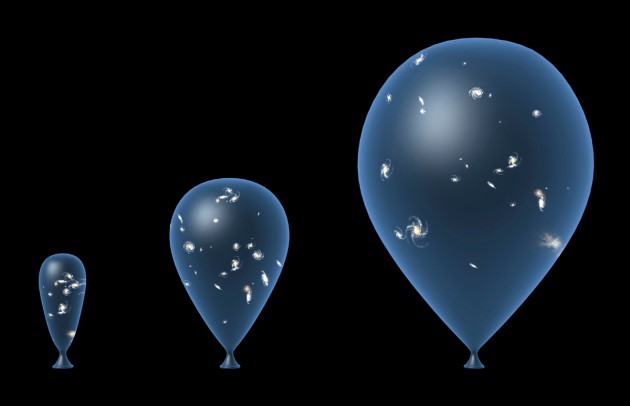
Will gravity win, because of what the Universe will reach its maximum size, to reverse the expansion and recollapse in Great Compression?
Will the expansion win, because of what the Universe will forever expand, never ceasing, pushing everything away at arbitrarily great distances from each other, and ending with the Big Frost?
Or we will live in a case located just on the border of the first two, where only one additional atom would lead to a recollapse, where the expansion rate asymptotically tends to zero, but never reverses: the critical Universe.
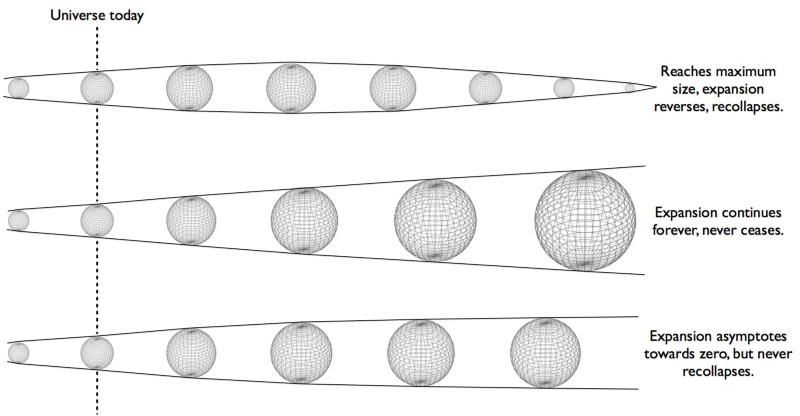
And although these outcomes are very different, they have a common feature. Take a look at today's Universe, at any of the galaxies. All that you can see - on the very verge of appearance - is a galaxy, whose light reaches us only now, having made our way through the Universe.
A lone photon, having spent billions of years traveling through the expanding space that separates us, ultimately gets into our eyes. After all this time spent in the heat against the current, against the expanding universe, he caught up with us.
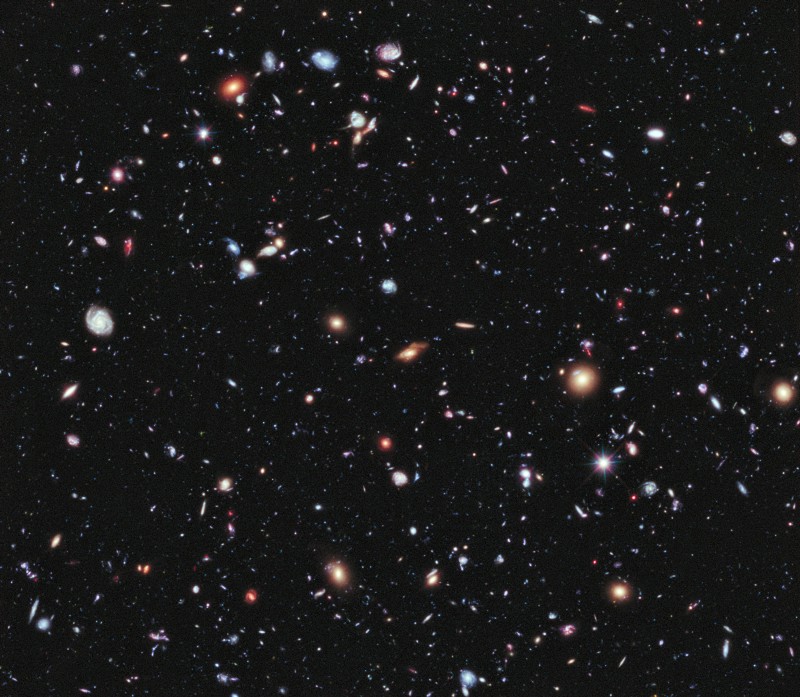
Over time, in the first 7.8 billion years of the Universe, the light from more and more galaxies caught up with us.
Why?
Because the expansion of the Universe slowed down - that is, despite the expansion, and constantly removing galaxies from us, the speed of their removal all the time decreased. As a result, galaxies, which were initially invisible to our eye because of too far distance, became visible to us.
Over time, it became possible to observe an increasing part of the universe. If only matter and radiation were present, it would last forever, regardless of the outcome that awaits us. We would have more and more available, the slowdown would continue, and the question would be just what would happen to the extension. It would:
- reached zero and then turned (Great compression);
- decreased, but remained positive, and everything would fly apart even further (Big Freeze)
- asymptotically tends to zero, but did not reach it (Critical case)
But with the fall of the energy density that occurs as the Universe expands, something amazing has been seen: space has its own inherent energy, a new type of it: dark energy.

Only when the density of matter and radiation fell dramatically — which took billions of years — did this dark energy become noticeable, and it took 7.8 billion years for the Big Bang to change the history of the cosmos.
It was at that moment when the density of dark energy became large enough to reach a third of all energy in the Universe, instead of slowing down, the galaxies began to scatter from us with acceleration. This means that their speeds do not decrease, but increase!

The light from the galaxies, from which he had already reached, continues to grow — the acceleration of the Universe will not change this. But we will not see the new light from many galaxies - only the light that they emitted a long time ago. Think about why.

A distant galaxy emits light in an expanding universe. The space between us and this galaxy continues to expand, but the photon is still flying towards us. Since the galaxy is constantly emitting light, it not only reaches us now - in the future there will also be light that reaches us!
But think about where this galaxy is today. Think of an expanding, accelerating universe. Think how big it is today.
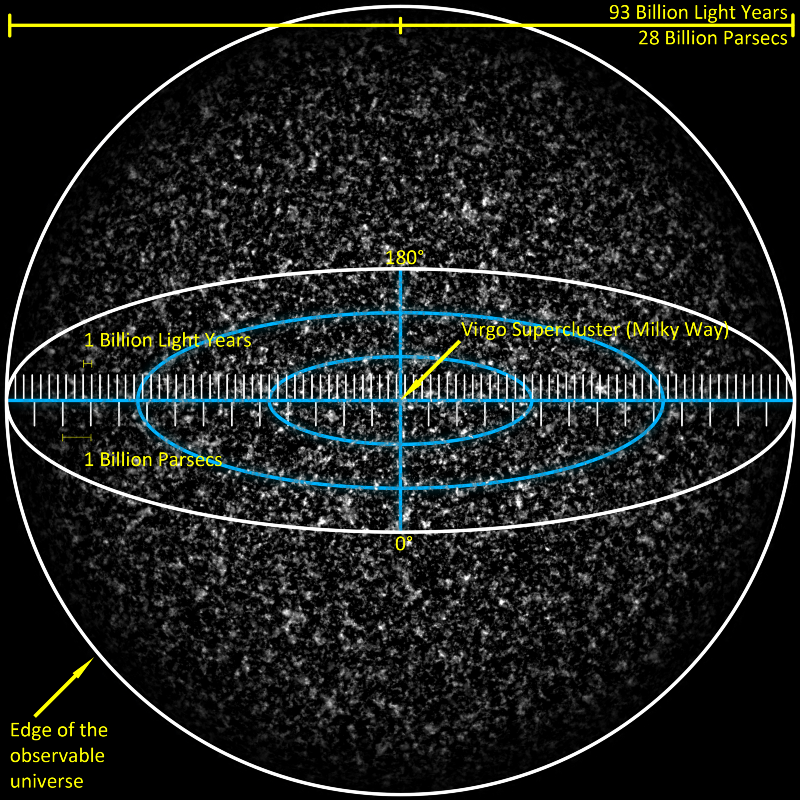
This picture is almost relevant: the diameter of the observed part of the Universe is approximately 92 billion light years, and it contains at least hundreds of billions (perhaps trillions) of galaxies.
The thing is that any galaxy more than 14 billion light-years distant from us no longer emits the light we see: the expansion of the space between this object and us occurs so quickly that the photon emitted today will never get to us! By calculating the volume of the observable universe contained in a sphere with a radius of 14 billion light years, and comparing it with the contents of a sphere with a diameter of 92 billion light years, you will find that we are associated with only 3% of all galaxies: all the rest are lost forever!

Over time, more and more galaxies and clusters will leave our horizon. This does not mean that we will stop seeing them, it means that we will not be able to get to them. Unless we have an ultrarelativistic spacecraft, unless we can send them something at the speed of light.
But the light that we emitted billions of years ago can still reach them. Only here, in the same way as in the case of light, reaching from them to us:
- its quantity is limited;
- he is experiencing a very strong redshift;
- time in it is stretched, that is, events are stretched in time;
- its expiration is less with time.
To detect these distant galaxies experiencing a redshift, we need to “leave the shutter open” longer.
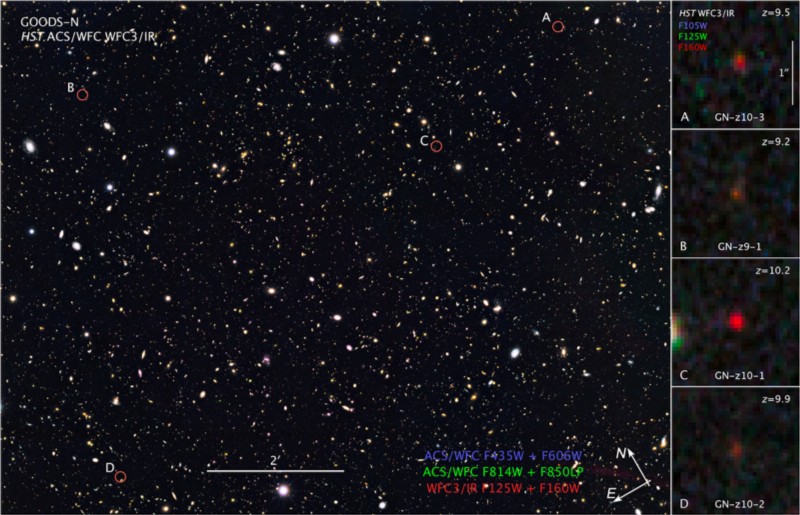
If dark energy did not exist, there would be no acceleration and disappearing galaxies. The Big Bang could have happened the same way, but today our Universe would be much smaller, the galaxies would be closer, we would see them more, they would not be so shifted to the red spectrum, and the Universe would not expand so quickly, and each galaxy would slow down. Instead of the galaxies disappearing one by one in three years, we would have opened up new ones!
And although no galaxy has completely disappeared from the field of view, 97% of them have disappeared in the sense that they have become unattainable, and that the light emitted by them today will never reach us. They are still visible, but only because of their old world.

This is how our disappearing Universe works, and this is what it means when galaxies disappear from our field of vision. Thank you for the wonderful question, and I hope that the explanation has been made clear for you and for the rest. Send me your questions and suggestions for the following articles.
Source: https://habr.com/ru/post/372451/
All Articles